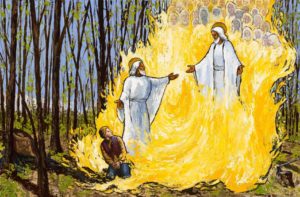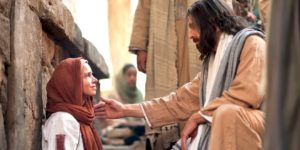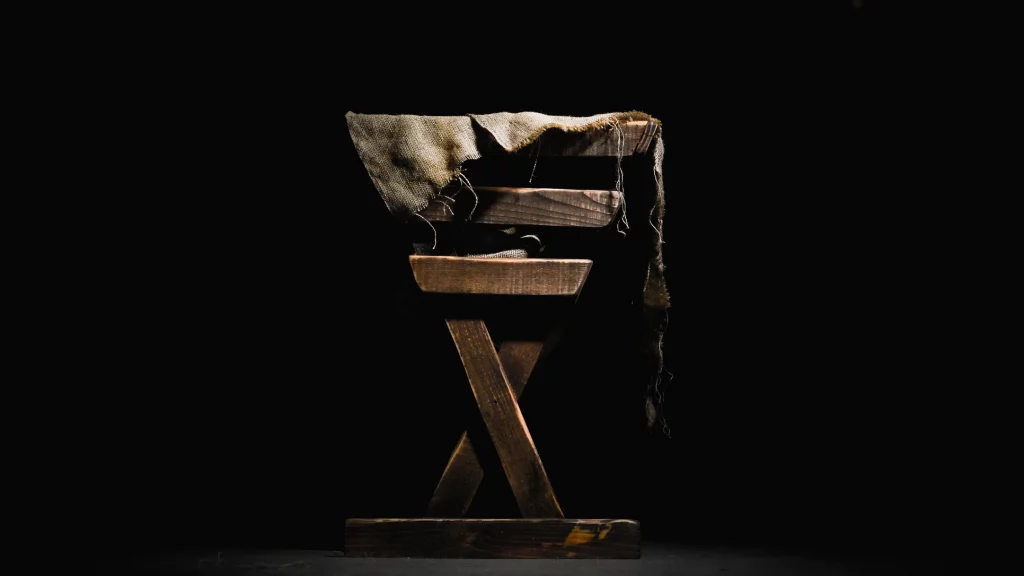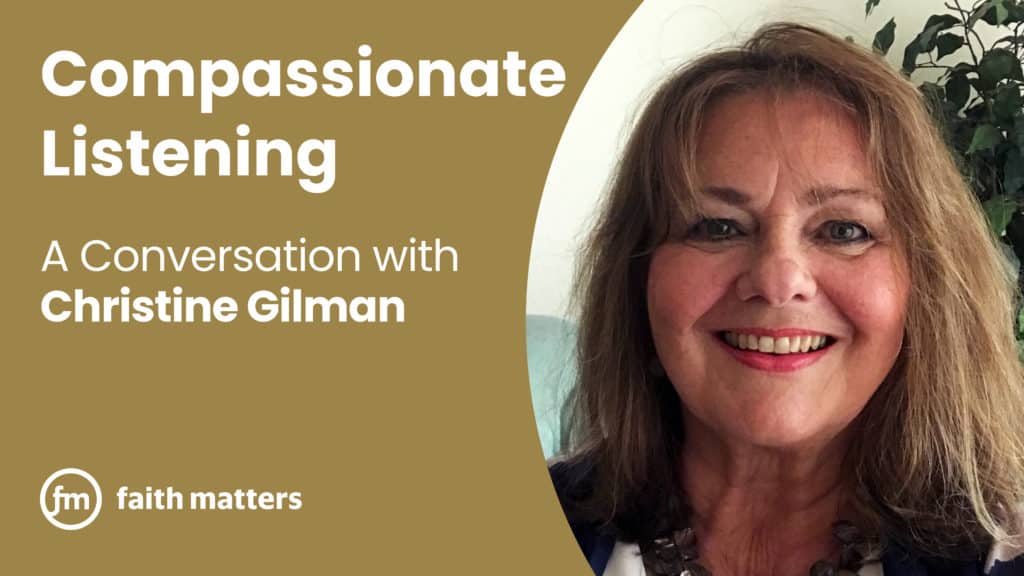As part of our ongoing Big Questions project, we begin this week to look at the following question.
Our scriptures seem to portray a God who is sometimes full of mercy, understanding and forgiveness and at other times vengeful and ready to pronounce final judgement on us. Why is that? What if I can’t believe in a God like that?
We’ve asked Fiona Givens to lead this conversation, and she begins with this thoughtful and moving essay.
* * * * * * * * * * *
“Fear rarely has the power to change our hearts, and it will never transform us into people who love what is right and who want to obey Heavenly Father. People who are fearful may say and do the right things, but they do not feel the right things. They often feel helpless and resentful, even angry. Over time these feelings lead to mistrust, defiance, even rebellion.” (Elder Dieter F. Uchtdorf, “Perfect Love Casteth Out Fear”, April 2017 General Conference)
* * * * * * * * *
Our personal belief systems are shaped by the religious paradigms we inhabit. Our views of God and His character determine how we see ourselves in our relationship to the divine and to our fellow sojourners.
The Prophet, Joseph, was a product of the religious world view that dominated nineteenth century America, shaped by the King James Bible but, perhaps to a greater extent, by John Milton’s riveting version of the biblical story. Thousands of adumbrated copies of “Paradise Lost” were distributed liberally in 19th century America. Divested of the full text’s Greek and Roman theology, the book was very accessible and with Milton’s detailed descriptions of the war in heaven and the Fall, it was a page turner from the start.
From the outset, Milton points to a problematic relationship between God the Father and God the Son as pertains to the Fall of Adam and Eve and their posterity. The Father and the Son are divided on how to resolve the situation. Following the disastrous Fall, the Son encourages the Father towards grace and clemency, but to no avail. God will have none of it:
“Man hath offended the majesty of God [therefore] Grace cannot be extended towards man…and therefore with all his progeny devoted to death must die, unless someone can be found sufficient to answer for his offence, and undergo punishment… [In Response] The Son much more to pity inclined, He to appease [God’s] wrath, and end the strife of mercy and justice…offered himself to die for man’s offence”.((Milton, Paradise Lost Book III, 8-15; 405-409))
It is surely confusing to any reader to discover that God the Father and God the Son who, together, created the earth and its inhabitants, are now to be found on opposing teams. God, in his unmitigated anger, desires to destroy mankind. Christ, in his pity, seeks to redeem God’s children from the exacting, justice-claiming, bewildering Parent. It is no wonder that Joseph hesitates before entering the Grove that Spring morning of 1820.
“At length I came to the conclusion that I must either remain in darkness and confusion, or else I must do as James directs, that is, ask of God. I at length came to the determination to “ask of God,” concluding that if he gave wisdom to them that lacked wisdom, and would give liberally, and not upbraid, I might venture.”((Joseph Smith—History 1:13))
Dictionary synonyms for upbraid include “scold,” “berate,” “rail against,” “reproach severely,” “vituperate.” Venture is defined as a “risky or daring journey or undertaking, daring to do something or go somewhere that may be dangerous.”
And it was a dangerous journey. As soon as Joseph begins to pray he is assailed by a malevolent energy bent on his annihilation, but which is soon dispatched with the coming of the Fire from Heaven, which descends slowly and deliberately to earth in the shape of a pillar. So intense was the descending light that Joseph feared lest the trees enveloped by the fire should be consumed by the flames and marveled that they were not.((“Appendix: Orson Pratt, A[n] Interesting Account of Several Remarkable Visions, 1840,” p. 5, The Joseph Smith Papers)) Instead, Joseph and the surrounding wood are embraced by a fire that burned brightly but did not consume, reminiscent of a similar event at the beginning of Exodus.

Two figures emerge from the fire, one of whom calls the young boy by his personal name—Joseph. In the articulation of his name, the shaken boy hears himself called by a divine voice of absolute love—a voice which never anger speaks, nor malice, unkindness, disrespect, judgment, nor blame—for God is incapable of feeling anything but absolute love toward the children struggling to gain a foothold on this bewildering planet. The voice uttering words of peace, joy, gentleness, kindness, and solace to Joseph and to each one of us, is the voice of God Almighty.
Joseph walked into the grove to address a God sometimes described as vengeful and violent in the biblical text and in Milton. The God he encountered, however, was full of love and compassion and mercy—just like His Son. This changed the entire trajectory of Joseph’s life, I believe. As a result of this encounter Joseph wrote that it was absolutely imperative that each one of us obtain “a correct idea of God’s character, perfection, and attributes.”((Lectures on Faith 3:2-5))
This gracious God dominates the Restoration narrative, for there are two other instances, in addition to Joseph’s, that claim our God to be a God of empathy and absolute love. Enoch, perhaps surprisingly, is similarly unaware of the depths of God’s love and compassion. After ascending to heaven Enoch is stunned to witness his God unequivocally manifesting grief for His children who have not ascended with Enoch and Zion.
“And it came to pass that the God of heaven looked upon the residue of the people, and he wept; and Enoch bore record of it, saying: How is it that the heavens weep, and shed forth their tears as the rain upon the mountains? And Enoch said unto the Lord: How is it that thou canst weep seeing thou art holy, and from all eternity to all eternity/ and where the habitation of thy throne is naught but peace, equity, truth [and] mercy shall go before thy face and have no end; how is it thou canst weep?”((Moses 7:28-31))
And God responds: “Wherefore should not the heavens weep, seeing these [the residue of my children] shall suffer?”((Moses 7:37))
We see the God of Joseph and Enoch again in Jacob 5. In this story one is privy to the Father’s thoughts as he tends to each tree in the olive grove. With the help of his Son, God works assiduously with each and every tree, pruning it, digging about it, and nourishing in order that he may “preserve” the tree, that “it perish not”. The thought of losing any one of the trees causes him intense distress, for he repeats over and over “it grieveth me that I should lose this tree.”((Jacob 5:3-7)) When it appears that his work among the children of man might fail, the Father intensifies his efforts, working tirelessly and relentlessly that he should not lose any of his trees. He bestows the same love and attention on every single tree in the garden, no matter how diseased it is. He is tireless. He won’t give in to fatigue. He never gives in to failure. His trees are his life, his joy, and his love. After one particularly difficult season in which many of his trees are struggling to survive, Zenos records that the Lord of the olive grove breaks down entirely: “And it came to pass that the Lord of the vineyard wept.”.((Jacob 5:41))
The verbs reiterated again and again in this story are “nourish”, “preserve” and “grieve”. What this emphasizes is that our God and His Son are committed to a rescue plan for each and every one of their children. They have promised us that they will not fail. They shall continue to labour in the olive grove until all the children are safely home. When the earth and each one of her inhabitants have reached the full measure of their creation then shall the Holy Spirit descend in fire to purify the earth with all her beloved inhabitants.((Jacob 5:77))
Joseph continued to iterate, together with the loss of the empathic God, that “many things in the scriptures do not as they now stand accord with the revelation of the Holy Spirit to me”.((History of the Church, 4:207-212)) First Nephi 13 discusses the disastrous results on the human condition when the biblical text is hijacked for nefarious purposes by interlopers who, intentionally or unintentionally, remove and distort the “plain and precious” teachings leaving in their wake broken hearts and broken minds. The Book of Mormon acknowledges as much and proclaims that God will not “suffer that the Gentiles shall forever remain in that awful state of woundedness, which thou beholdest they are in, because of the plain and most precious parts of the gospel of the Lamb which have been kept back…”((1 Nephi 13: 32, 1830 edition))
Even though we live in a time of the restoration of the Good, the True, and the Beautiful, it is nevertheless extremely difficult to erase the collateral damage inflicted on the souls of the children of Heavenly Parents who may have been raised with the notion that God can be oppressive, demanding, harsh, impatient, and exacting. Elder Jeffery R. Holland acknowledges this dark legacy when he writes “on a particularly difficult day…what would this world’s inhabitants pay to know that heavenly parents are reaching across…streams and mountains and deserts, anxious to hold them close?”((Jeffrey R. Holland, However Long and Hard the Road, SLC: Deseret Book, 1985, 47))
Yet this is The Good News. The restored gospel announces that the collaborative mission of the Godhead is to bring to pass the immortality and eternal life of every child who has walked, and will walk, this gorgeous planet we call home.

Decades before Joseph’s experience, Sarah Edwards had a similar encounter with Deity. Edwards was married to the very influential preacher and theologian Jonathan Edwards, who had famously penned Sinners in the Hands of an Angry God. Disturbed, one evening, by a prayer offered by a visiting preacher in her home, Sarah’s journal recounts that she repaired to her room with an agitated heart. Shortly thereafter both the Father and the Son appear in her room. Sarah records that:
“…the presence of God was so near, and so real, that I seemed scarcely conscious of anything else. God the Father and the Lord Jesus Christ seemed as distinct persons, both manifesting their inconceivable loveliness and mildness and gentleness, and their great immutable love to me…The peace and happiness, which I hereupon felt, was altogether inexpressible”.((Sarah Edwards, in Works of President Edwards, vol. 1, pp. 172–73; italics in original; see also George M. Marsden, Jonathan Edwards: A Life (New Haven, Connecticut: Yale University Press, 2003), pp. 243–44.))
None of us is immune from doubt, unsettling questions, fear, consternation and suffering. What our religious tradition emphasizes, however, is that the purpose of Christ’s life was to share in each others afflictions:
“He shall go forth, suffering pains and afflictions and temptations of every kind; and this that the word might be fulfilled which saith he will take upon him the pains and the sicknesses of his people. And he will take upon him death that he may loose the bands of death which bind his people; and he will take upon him their infirmities, that his bowels may be filled with mercy, according to the flesh, that he may know according to the flesh how to succor his people according to their infirmities”.((Alma 7:11-12))
What is truly radical about this Restoration verse, however, is that the emphasis of Christ’s mission is on healing humankind from our wounds rather than saving us from our sins. While we all sin in very real ways, it is the woundedness that preceded the sin as well as the woundedness that follows the sin that is the primary preoccupation of the Divine Family.
If helping us become whole is the primary purpose of the Godhead, then why do we not feel comforted, aided or answered when we seem most in need of counsel and direction? Why are answers to our doubts, questions and fears so long in coming if they come at all? We sometimes forget that the overarching moral principle of our universe is agency, against which God is powerless. It may be that God cannot answer our question so devoutly to be wished because to do so would be to impinge on the agency of another. Sometimes answers do not come because we are asking the wrong question or we are not allowing God the opportunity to answer us in another way.
Jesus himself was not immune to this plight. Dread and nausea fill him as he approaches the Garden of Gethsemane where nothing but horror and death await him. In the blessed light and joy of the Heavenly realms, the cost of discipleship was one hypothetical option among other hypothetical options. But there was nothing hypothetical about his situation now, and Christ is stunned to find himself collapsing under the sheer weight of the terror and the pain leering up at him from the cup filled to the brim with human suffering, disease, grief and fear.
He tries to turn away from the cup that contains the bitter concoction, but it can be drunk by Him alone. Terrified by what lies before Him and afraid that he might not survive the suffering, he collapses, pleading with His Father to “remove this cup from me.”((Luke 22:42)) It is vital we understand that this is not a rhetorical question, and to realize that the Father, Himself in agony, cannot answer that question in the affirmative. The eternal destiny of every person who has ever lived or will ever live, hangs on this precise moment in history. The universe waits.
“And there appeared an angel unto him from heaven, strengthening him”.((Luke 22:43)) An angel arrives to embrace the Son of God, to comfort and strengthen the Child through the long, agonizing night. It is interesting that in the biblical narrative “angel” can be a pseudonym for “God,” as the story of Hagar illustrates. Given our belief in Heavenly Mother, it is not inconceivable that the “angel” who came to minister to Jesus was His Mother:
It is generally assumed that the Atonement was worked out by Christ alone in Gethsemane and on the cross. Yet the Restoration texts present an alternative view. In our tradition it is the work of the Godhead to bring each child home to hot baths and towels warming in airing cupboards. President Kimball, however, suggests that others may be invited to collaborate with the divine family in fulfilling the New and Everlasting Covenant made in pre-mortal realms. “It is usually through another person that God meets our needs,” he notes.((Small Acts of Service, December 1974 Ensign)) I not only believe the statement to be true. I believe it to be salvific. Like C.S. Lewis, I believe that the Divine Family has invited each of us to be a “little Christs,” collaborating with the Godhead in their combined ministry to sanctify the entire human family—to make each one of us whole from disease, depression, alienation, abandonment, fear and loneliness. In short, we have been invited to be Healers on Mt. Zion.
The invitation is extended to us at the baptismal font in the form of three covenants: That we be–
- Willing to bear one another’s burdens, that they may be light
- Willing to mourn with those that mourn
- Willing to comfort those in need of comfort
What makes this particular covenant so efficacious in its power is that each member of the Godhead is present to ratify and sanctify these particular covenants.
- The God who is willing to carry our burdens all the way through his life, into Gethsemane and onto Golgotha, is God the Christ.
- The God who mourns with those that mourn, as Enoch discovered, is God the Father
- The God who comforts us when we stand in need of comfort, is God the Holy Spirit.
These are the covenants on which Zion is to be built under the guidance and the direction of the Holy Spirit.
“And if we draw out our souls to the hungry, and satisfy the afflicted soul, we shall be guided continually and shall be like a watered garden, and like a spring whose waters fail not.”((Isaiah 58:11))
And God will call us Zion because we are of one heart and one mind…and there will be no poor among us and we shall all be whole as the Father, the Son, and the Holy Spirit are whole.
Other Resources
Who is the Christ of the Restoration? An interview with Marlin K. Jensen and
Terryl Givens.
The Restored Gospel’s Radical Perspective on Atonement and Grace
The Christ Who Heals, A Conversation with Terryl and Fiona Givens
The Christ Who Heals: How God Restored the Truth that Saves Us (Deseret Book company, published 2017).


